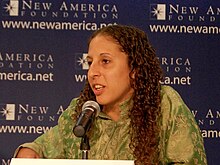Farah Stockman
Farah Stockman | |
|---|---|
 Stockman in 2009 | |
| Born | Farah Nisa Stockman May 21, 1974 |
| Alma mater | Harvard University[1] |
| Years active | 1996–present |
| Known for | Pulitzer Prize-winning journalist |
Farah Nisa Stockman (born May 21, 1974)[2] is an American journalist who has worked for The Boston Globe and is currently employed by The New York Times. In 2016, she was awarded the Pulitzer Prize for Commentary.[3]
Early life
Stockman was born in East Lansing, Michigan, to a white father and a black mother who were Michigan State University professors. She has a sister, Demress.[3]
Education
Stockman attended Radcliffe College, graduating in 1996.[4][5] She was an active member of the Radcliffe Rugby Football Club.[6] In the summer of 1996, Stockman directed the Mission Hill Summer Program with Harvard's Phillips Brooks House Association.[7]
Kenya, 1997–2000
Following graduation Stockman served as a school teacher in Kenya for two years. Stockman and other teachers set up the Jitegemee non-governmental organization.[8] While living in Kenya, Stockman began writing for The New York Times, The Christian Science Monitor, the Voice of America and Reuters. During her time in Kenya, Stockman covered the international criminal trials stemming from the Rwandan genocide.[9]
Attempts to interview Mubarik Shah Gillani
Stockman is reported to have been seeking to interview Mubarik Shah Gillani, an individual who was in hiding, who was also being sought by Daniel Pearl at the time of his death.[10] Mariane Pearl, Daniel Pearl's wife, wrote that an article Stockman wrote, linking Gillani to Richard Reid, was the inspiration for her husband to seek the interview that led to his capture and death.[citation needed]
The Boston Globe
Upon her return to the United States, Stockman started working for The Boston Globe. She worked in the Globe's Washington bureau before becoming a member of the paper's editorial board and an editorial columnist.[11] In 2016, she moved to The New York Times.
Other writing
In 2021, Stockman published American Made based on her prior reporting for The New York Times about the Rexnord factory closure.
Awards
Stockman was a winner of an award from the J. W. Saxe Memorial Fund in the 1990s.[12] Stockman won her award for her work "with homeless children in Machakos, Kenya". Stockman subsequently became one of the fund's directors.[citation needed]
In 2009, Stockman won the William Brewster Styles Award.[13] The award was given by the Scripps Howard Foundation and accompanied by $10,000. Stockman's award was "for identifying U.S. corporations that were covertly using international relationships and offshore operations to avoid taxes, side-step U.S. laws and deny workers' rights."
In 2014, at the annual meeting of the Association of Opinion Journalists in Mobile, Stockman received The Eugene C. Pulliam Fellowship for Editorial Writing, presented by the Sigma Delta Chi Foundation, the educational arm of the Society of Professional Journalists. It awards $75,000 each year to an outstanding editorial writer or columnist to help broaden his or her journalistic horizons and knowledge of the world. Stockman was writing a study of race relations, especially in Boston, riven by the 1974 court order to bus students to address de facto segregation in the schools.[citation needed]
In 2016, Stockman was awarded the Pulitzer Prize for Commentary, in recognition of a series of articles examining the effects of busing on Boston schools.[3]
Personal life
Stockman resides in Cambridge, Massachusetts, with her husband, Gene Corbin, a former Harvard assistant dean of public service, and their child.[3]
References
- ^ a b "The 2016 Pulitzer Prize Winner in Commentary: Farah Stockman of The Boston Globe Author of "American Made: What Happens to People When Work Disappears"". Columbia University. Retrieved December 15, 2016.
- ^ Farah Stockman (@fstockman) (May 21, 2014). "Another quote for the oldsters on their birthday: Just remember, once you're over the hill you begin to pick up speed. - Charles M. Schultz". Twitter. Retrieved April 20, 2016.
- ^ a b c d "East Lansing native Stockman wins Pulitzer Prize". Lansing State Journal. May 7, 2016. Retrieved June 20, 2019.
- ^ Mitrokostas, Nicholas K. (1995-09-30). "Seniors Begin Race For Marshal Positions". The Harvard Crimson. Archived from the original on 2004-11-08. Retrieved 2008-10-24.
- ^
"Harvard Radcliffe Class of 1996: Class officers". Harvard University. 1996. Archived from the original on 2010-07-11. Retrieved 2008-10-24.
The Scripps Howard Foundation today announced the winners of its annual National Journalism Awards, honoring the best in print, Web and electronic journalism and journalism education in 2008.
- ^ Peter K. Han. "Radcliffe Rugby Rises to Top." 1995. Retrieved 2016-07-27. [1]
- ^
"jitegemee -- Who we are". Archived from the original on 2008-05-09. Retrieved 2008-10-24.
Farah Stockman is reporter with the Boston Globe and lives in Washington D.C. She lived in Kenya and Tanzania from 1997 to 2000, working first as a full-time teacher at the Katoloni Rehabilitation Centre for street children in Machakos, Kenya and then as a freelance journalist. Farah founded Jitegemee with support from the local community in Kenya. Previous non-profit experience includes directing the Mission Hill Summer Program with Harvard's Phillips Brooks House Association in 1996.
- ^ "jitegemee". Archived from the original on 2008-12-07. Retrieved 2008-10-24.
- ^ Farah Stockman (2000). "The People's Court: Crime and punishment in Rwanda". Vol. 9, no. 8, number 4. Project MUSE. pp. 20–41. Retrieved 2010-07-01.
- ^ Mariane Pearl, Sarah Crichton (2003). A Mighty Heart: the brave life and death of my husband, Danny Pearl. Simon & Schuster. ISBN 978-0-7432-4442-8. Retrieved 2010-07-01.
- ^ "Farah Stockman". The Boston Globe. Archived from the original on February 2, 2016. Retrieved December 15, 2016.
- ^ "Board & Officers". J. W. Saxe Memorial Fund. Retrieved 2010-07-01.
- ^ "Scripps Howard Foundation Announces National Journalism Awards Winners". Scripps Howard Foundation. 2009-03-19. Archived from the original on 2010-07-02. Retrieved 2010-07-01.

